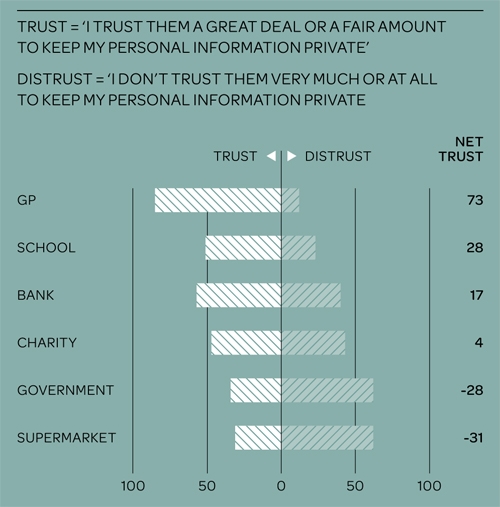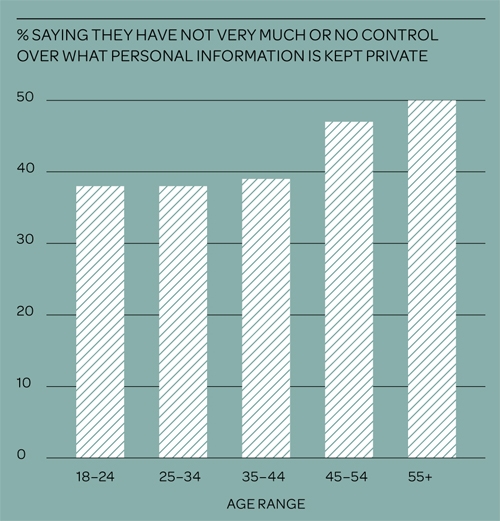MRS Delphi Group launches new consumer privacy report
16 March 2015
Report reveals that only one in ten of us feel in complete control of our personal data remaining private.
The MRS Delphi Group, a think tank set up by MRS, has today launched a new report on consumer privacy – ‘Private Lives? Putting the consumer at the heart of the debate’.
It has been produced by the most respected thinkers in the research and marketing sector including: Edwina Dunn, co-founder of dunnhumby and CEO of Starcount; Colin Strong, UK-based consumer researcher and author of ‘Humanizing Big Data’; and Jane Frost CBE, MRS’ Chief Executive and founder of the MRS Delphi Group.
The report puts consumers at the heart of the privacy debate, highlighting that up until now privacy has largely been treated as a political football which has focused too much on the legal and technological aspects of holding personal data. It shows that only one in ten of us feel in complete control over our personal information being kept private.
It also reveals that the UK Government is only marginally more trusted than the supermarkets when it comes to looking after personal information and that banks are more trusted than charities. In a demographically representative poll conducted by YouGov for the MRS Delphi Group, the net trust score for a bank is found to be 17, compared to a charity of 4, while government scores minus 28 against supermarkets of minus 31.
The same poll identifies a trend of growing consumer unease about how personal information is collected and stored. 70 percent of people surveyed said that privacy of personal information is more important now than it was five to ten years ago.
When it comes to the value exchange (quid-pro-quo) that takes place between consumers and organisations for personal information, the majority of consumers do recognise this exchange exists, 64% of consumers think that companies get more or all of the benefit from the information we share with them, and 60% think the same of government held data.
The research also highlights that the older people get, the more likely they are to think that organisations rather than individuals benefit most – a lesson to business and government alike.

As well as quantifying these trends, the report highlights that the increasing datafication of people’s lives inevitably creates benefits for institutions – brands can sell us more, governments can identify security risks more easily and welfare agencies can spot fraud. It also identifies the role that data might play in the rise of growing social inequality, suggesting that a ‘two-tier’ system could develop in which institutions know a great deal about the less advantaged members of society and much less about the wealthier. It points to examples such as the Blackphone, a $629 Android-based smartphone that has privacy-protecting software installed to allow users to send encrypted texts and calls, and the ability to purchase “reputation packages” to monitor when an individual is mentioned online, citing $99 starter packages and $5,000 annual fees to this end.
It also challenges the myth that teenagers do not care about their personal data privacy. In reality teenagers take the issue seriously and are very active in safeguarding their privacy using social coding such as ‘in-jokes’ or ‘vaguebooking’ (using an intentionally vague Facebook status to hide the true meaning of their messages). Another trend is to dirty their data by putting in false personal details to help manage their privacy.
The lead author of the report, a UK-based consumer researcher and author of ‘Humanizing Big Data’, Colin Strong, comments: “People are recognising the value of their personal information and institutions need to be prepared for a more robust justification of what is currently being traded in exchange for disclosure. Value is not just monetary, but social and emotional as well. This report is an attempt to broaden the privacy debate and help organisations and institutions properly consider the implications from the perspective of individual consumers and citizens.”

Jane Frost CBE, MRS’ Chief Executive and founder of the MRS Delphi Group, said: “Personal information – be that data about an individual’s shopping habits, banking details or personal opinions – is at the heart of all consumer research. As this report shows, this information in increasingly recognised as a tradable commodity but in order for consumers to maintain confidence that their data will be held and treated with respect, organisations need to more transparent and accountable about how they use and store our personal data. This is the reason why MRS launched its ethical data trust mark, Fair Data; to help organisations engage in a much more transparent ‘data dialogue’ with their customers and stakeholders.”
There is a call to action by the members of the MRS Delphi Group to government, business and other organisations, to really debate and tackle head-on the responsibility that they have when collecting, holding and using personal data to do so with transparency in order to maintain trust – for their sake as much as consumers.
Impact 2015 - polling debate
The report will be launched at Impact 2015 - MRS Annual Conference - 17 and 18 March. The conference includes:
- a session 'Privacy is no longer a social norm' discussing some of the themes within the report
- a special debate, the ‘poll of pollsters’ chaired by Deborah Mattinson, to take stock of political polling in the UK ahead of the general election.
Download the report
Download a full copy of 'Private Lives?' (PDF).
All figures, unless otherwise stated, are from YouGov Plc. Total sample size was 2,168 adults. Fieldwork was undertaken between 17th–18th February 2015. The survey was carried out online. The figures have been weighted and are representative of all GB adults (aged 18+).
Get the latest MRS news
Our newsletters cover the latest MRS events, policy updates and research news.











